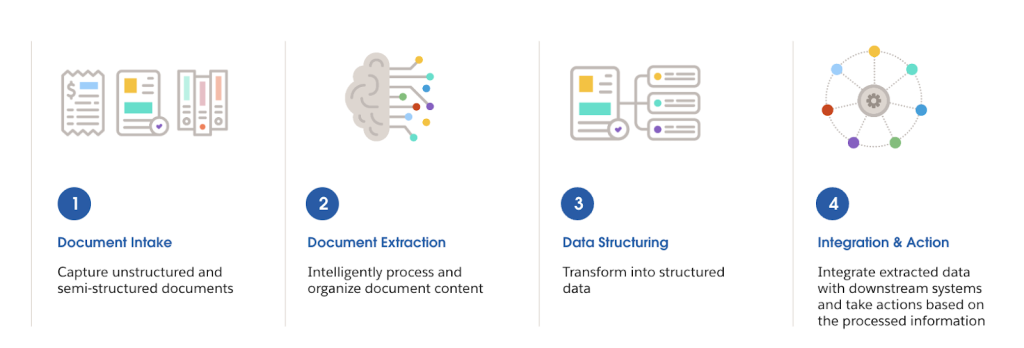The adoption of cutting-edge technologies is imperative to meet the increasing demands for efficiency, accuracy, and patient-centered care. One such transformative technology is Intelligent Document Processing (IDP). By harnessing the power of artificial intelligence (AI) and machine learning (ML), IDP revolutionizes how healthcare organizations handle and utilize vast amounts of data, driving improvements in clinical workflows, patient outcomes, and operational efficiency.
Understanding Intelligent Document Processing
Intelligent Document Processing is an advanced form of automation that goes beyond traditional document management systems. It employs AI and ML algorithms to automatically capture, extract, classify, and process data from a wide array of documents. These documents can range from structured forms, such as insurance claims and lab reports, to unstructured data like doctor’s notes and patient records.

4 core components of IDP
- Optical Character Recognition (OCR): Transforms various types of documents, including scanned paper documents, PDFs, and images into editable and searchable data.
- Natural Language Processing (NLP): Understands and interprets human language, enabling the extraction of relevant information from unstructured text.
- Machine Learning (ML): Learns and improves the accuracy of data extraction and classification processes through exposure to new data and patterns.
- Robotic Process Automation (RPA): Automates repetitive tasks, allowing for seamless integration of processed data into existing workflows and systems.
The role of IDP in healthcare
IDP is transforming healthcare by automating the handling of vast amounts of data, which enhances operational efficiency and accuracy. By streamlining administrative tasks, improving clinical documentation, and managing patient data more effectively, IDP enables healthcare professionals to focus more on patient care.
Additionally, IDP accelerates research by quickly processing and analyzing data from clinical trials and research documents. This comprehensive approach not only reduces errors and saves time but also supports better patient outcomes and compliance with regulatory standards.
Streamlining administrative tasks
Healthcare providers are burdened with administrative tasks that consume valuable time and resources. IDP can significantly reduce this burden by automating processes such as patient registration, insurance claims processing, and billing. By quickly and accurately extracting data from forms and documents, IDP minimizes manual data entry errors and accelerates the processing time, allowing healthcare staff to focus more on patient care.
Enhancing clinical documentation
Clinical documentation is critical for patient care, regulatory compliance, and billing. However, it is often time-consuming and prone to errors. IDP can automate the extraction of key clinical information from various sources, including doctor’s notes, lab results, and radiology reports. This ensures that accurate and up-to-date information is readily available in the patient’s electronic health record (EHR), improving the quality and continuity of care.
Improving patient data management
The healthcare industry generates an enormous amount of data daily, making effective data management a challenge. IDP enables healthcare organizations to efficiently organize and manage patient data by automatically indexing and categorizing documents. This not only enhances data accessibility but also supports compliance with data protection regulations, such as HIPAA, by ensuring that sensitive information is handled securely.
Accelerating research and innovation
Research institutions and pharmaceutical companies rely on vast amounts of data to drive medical research and innovation. IDP can expedite the extraction and analysis of data from clinical trial documents, research papers, and patient records. By streamlining data processing, IDP accelerates the discovery of new treatments, improves the accuracy of research findings, and supports evidence-based practice.
Case study: Sample Accessioning – End-to-End Laboratory Information Management System (LIMS) Automation
Let’s go through a real-life example of IDP in action with a case study from an actual company MuleSoft has worked with.
The company
A global diagnostics company aims to make personalized genetic testing and diagnostics a standard part of a person’s medical journey.
The challenge
The company faced the challenge of manually processing millions of orders and blood samples arriving at the lab. This involved entering data from requisition forms, barcodes, and clinical records into LIMS, requiring hundreds of staff hours daily.
Hundreds of thousands of hours per year were spent on manual data entry, leading to increased time and a higher risk of low data quality. These inefficiencies caused backlogs in sample processing, resulting in poor customer experience and lost revenue.
The solution
Implementing MuleSoft Automation with RPA and IDP, the company automated data capture and validation from LIMS, streamlining sample processing and triage.
The impact
With this solution, the company now processes 15,000 samples daily, saves over 100,000 hours annually, and realizes a potential $4 million in cost savings. By leveraging IDP, the company significantly improved efficiency, data accuracy, and customer satisfaction, demonstrating the transformative power of automation in healthcare.
By leveraging IDP, the company significantly improved efficiency, data accuracy, and customer satisfaction, demonstrating the transformative power of automation in healthcare.
IDP: The game-changing solution for healthcare
By automating and optimizing the handling of vast amounts of data, IDP streamlines administrative processes, enhances clinical documentation, improves patient data management, and accelerates research and innovation. As healthcare organizations continue to embrace digital transformation, the integration of IDP will be crucial in delivering efficient, accurate, and patient-centered care. The future of healthcare is intelligent, and IDP is at the forefront of this transformation.









